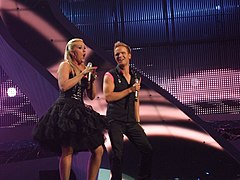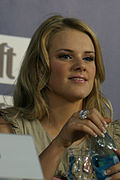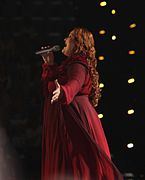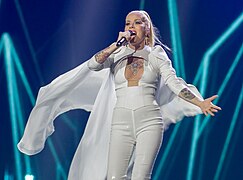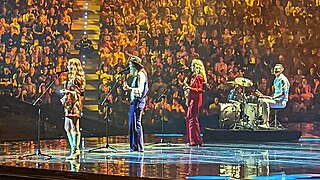Telecommunications in Iceland is a diversified market.
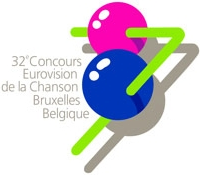
The Eurovision Song Contest 1987 was the 32nd edition of the annual Eurovision Song Contest. It took place in Brussels, Belgium, following the country's victory at the 1986 contest with the song "J'aime la vie" by Sandra Kim. Organised by the European Broadcasting Union (EBU) and host broadcaster Radio-télévision belge de la Communauté française (RTBF), the contest was held at the Centenary Palace on 9 May 1987 and hosted by French-Belgian singer Viktor Lazlo.

The Eurovision Song Contest 1986 was the 31st edition of the annual Eurovision Song Contest. It was held in Bergen, Norway, following the country's victory at the 1985 contest with the song "La det swinge" by Bobbysocks! Organised by the European Broadcasting Union (EBU) and host broadcaster Norsk rikskringkasting (NRK), the contest was held at Grieghallen on 3 May 1986 and was hosted by previous Norwegian contestant Åse Kleveland.

The Eurovision Song Contest 1988 was the 33rd edition of the annual Eurovision Song Contest. It took place in Dublin, Ireland, following Johnny Logan's win at the 1987 contest with the song "Hold Me Now". Organised by the European Broadcasting Union (EBU) and host broadcaster Radio Telefís Éireann (RTÉ), the contest was held at the RDS Simmonscourt on 30 April 1988 and was hosted by Irish broadcaster Pat Kenny and the Miss Ireland 1980 Michelle Rocca, marking the first time since the 1979 contest that two presenters had hosted the contest.

The Eurovision Song Contest 2002 was the 47th edition of the Eurovision Song Contest. It took place in Tallinn, Estonia, following the country's victory at the 2001 contest with the song "Everybody" by Tanel Padar, Dave Benton and 2XL. Organised by the European Broadcasting Union (EBU) and host broadcaster Eesti Televisioon (ETV), the contest was held at the Saku Suurhall on 25 May 2002. The contest was presented by Estonian opera singer Annely Peebo and actor Marko Matvere. It was the first Eurovision Song Contest held in one of the former Soviet republics.

The Eurovision Song Contest 2004 was the 49th edition of the Eurovision Song Contest. It took place in Istanbul, Turkey, following the country's victory at the 2003 contest with the song "Everyway That I Can" by Sertab Erener. Organised by the European Broadcasting Union (EBU) and host broadcaster Turkish Radio and Television Corporation (TRT), the contest was held at the Abdi İpekçi Arena, and, for the first time, consisted of a semi-final on 12 May, and a final on 15 May 2004. The two live shows were presented by Turkish actors Korhan Abay and Meltem Cumbul. It was the first time that Turkey had hosted the contest, 29 years after the country made its debut, and was also the first time since the 1998 contest in Birmingham that it was not hosted in the host country's capital city.
Ríkisútvarpið (RÚV) is Iceland's national public-service broadcasting organization.

The Eurovision Song Contest 2005 was the 50th edition of the Eurovision Song Contest. It took place in Kyiv, Ukraine, following the country's victory at the 2004 contest with the song "Wild Dances" by Ruslana. Organised by the European Broadcasting Union (EBU) and host broadcaster National Television Company of Ukraine (NTU), the contest was held at the Palace of Sports, and consisted of a semi-final on 19 May, and a final on 21 May 2005. The two live shows were presented by Ukrainian television presenters Maria Efrosinina and Pavlo Shylko.
RÚV is the main television channel of RÚV, the Icelandic public broadcaster, launched in 1966. The free-to-air channel broadcasts primarily news, sports, entertainment, cultural programs, children's material, original Icelandic programming as well as American, British and Nordic content. Among its highest-rated programs are the comedy sketch show Spaugstofan, mystery drama Ófærð (Trapped) and Fréttir (News).
Rás 1 is an Icelandic radio station belonging to and operated by Ríkisútvarpið (RÚV), Iceland's national public service broadcaster. Broadcast throughout Iceland on FM, via satellite, DVB and also 189 kHz longwave, it is currently among the country's most listened-to radio stations.
Iceland participated in the Eurovision Song Contest 1999 with the song "All Out of Luck" written by Selma Björnsdóttir, Sveinbjörn I. Baldvinsson and Þorvaldur Bjarni Þorvaldsson. The song was performed by Selma, which is the artistic name of Björnsdóttir who was internally selected by the Icelandic broadcaster Ríkisútvarpið (RÚV) in January 1999 to represent Iceland at the 1999 contest in Jerusalem, Israel. The Icelandic song, "All Out of Luck", was presented to the public on 9 April 1999 during the television programme Stutt í spunann.

The Eurovision Song Contest 2009 was the 54th edition of the Eurovision Song Contest. It took place in Moscow, Russia, following the country's victory at the 2008 contest with the song "Believe" by Dima Bilan. Organised by the European Broadcasting Union (EBU) and host broadcaster Channel One (C1R), the contest was held at the Olimpiysky Arena, and consisted of two semi-finals on 12 and 14 May, and a final on 16 May 2009. The semi-finals were presented by Russian model Natalia Vodianova and television presenter Andrey Malakhov, while the final was presented by Russian television presenter Ivan Urgant and former Russian contestant Alsou Abramova, becoming the first and to date only time that two different sets of presenters had hosted the semi-finals and finals.
Iceland was present at the Eurovision Song Contest 1986, held in Bergen, Norway. It was the first time Iceland was represented in the contest. While the country had satellite television contact from other nations since 1981, Iceland was not able to connect to other European nations by satellite before the end of 1985, meaning that 1986 was the first year Iceland could send a delegation to the Eurovision Song Contest.
Iceland participated in the Eurovision Song Contest 2001 with the song "Angel" written by Einar Bárðarson and Magnús Þór Sigmundsson. The song was performed by the duo Two Tricky. The Icelandic entry for the 2001 contest in Copenhagen, Denmark was selected through the national final Söngvakeppni Sjónvarpsins 2001, organised by the Icelandic broadcaster Ríkisútvarpið (RÚV). Eight songs competed in the selection which was held on 17 February 2001. "Birta" performed by Kristján Gíslason and Gunnar Ólason emerged as the winner exclusively through public televoting. The song was later translated from Icelandic to English for the Eurovision Song Contest and was titled "Angel", while the duo was renamed as Two Tricky.
Iceland participated in the Eurovision Song Contest 1997 with the song "Minn hinsti dans" written by Trausti Haraldsson and Páll Óskar Hjálmtýsson. The song was performed by Paul Oscar, which is the artistic name of Hjálmtýsson who was internally selected by the Icelandic broadcaster Ríkisútvarpið (RÚV) in February 1997 to represent Iceland at the 1997 contest in Dublin, Ireland. The Icelandic song, "Minn hinsti dans", was presented to the public on 11 March 1997.
Iceland participated in the Eurovision Song Contest 1995 with the song "Núna" written by Björgvin Halldórsson, Ed Welch and Jón Örn Marinósson. The song was performed by Bo Halldórsson, who was internally selected by the Icelandic broadcaster Ríkisútvarpið (RÚV) in December 1994 to represent Iceland at the 1995 contest in Dublin, Ireland. The Icelandic song, "Núna", was presented to the public on 19 April 1995 during the television programme Á tali hjá Hemma Gunn.
Iceland participated in the Eurovision Song Contest 2014 with the song "No Prejudice" written by Heiðar Örn Kristjánsson, Haraldur F. Gíslason and John Grant. The song was performed by the band Pollapönk. The Icelandic entry for the 2014 contest in Copenhagen, Denmark was selected through the national final Söngvakeppnin 2014, organised by the Icelandic broadcaster Ríkisútvarpið (RÚV). The selection consisted of two semi-finals and a final, held on 1, 8 and 15 February 2014, respectively. Five songs competed in each semi-final with the top two as selected by a public televote alongside two jury wildcards advancing to the final. In the final, the winner was selected over two rounds of voting: the first involved a 50/50 combination of jury voting and public televoting, which reduced the six competing entries to two superfinalists and the second round selected the winner exclusively through public televoting. "No Prejudice" performed by Pollapönk emerged as the winner after gaining the most public votes.

Líf, also known as TF-LÍF, is an Aérospatiale AS-332L1 Super Puma helicopter that served the Icelandic Coast Guard for 25-years. It is named after Líf, the only woman foretold to survive the events of Ragnarök from Norse mythology, and is the first Coast Guard aircraft to bear the name. It is the longest serving helicopter in the history of the ICG and gained national fame when it rescued 39 sailors in three separate incidents during a six-day period in March 1997. In 2024, it was put on display at the Icelandic Aviation Museum.
Iceland participated in the Eurovision Song Contest 2024 in Malmö, Sweden, with "Scared of Heights" performed by Hera Björk. The Icelandic broadcaster Ríkisútvarpið (RÚV) organised the national final Söngvakeppnin2024 in order to select the Icelandic entry for the contest.
Ingvi Hrafn Jónsson is an Icelandic news reporter and television host. He is known for his career as the news director for RÚV and Stöð 2 and later for his TV station ÍNN.


